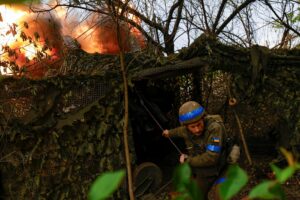In the conflict between Russia and Ukraine, Tajikistan takes a neutral position and “does not give priority to any side,” Khairiddin Usmonzoda, head of the Center for Strategic Studies under the President of Tajikistan, told a press conference on August 4.
Experts also believe that, given the issue of labor migration and maintaining relations with the West, Tajikistan should continue to adhere to a neutral policy on the Ukrainian crisis.
“We have good relations with Russia, and with Ukraine”
The Russian invasion of Ukraine has put the countries of Central Asia, including Tajikistan, in a rather unpleasant position. Dushanbe is a strategic partner of Moscow, but, on the other hand, closely cooperates with Ukraine and Western countries. The authorities of Tajikistan are trying not to indicate their position on the issue of Russia’s military invasion of Ukraine.
According to Usmonzoda, Dushanbe remains neutral in the conflict between Russia and Ukraine.
He also noted that Tajikistan has good relations with both Russia and Ukraine, and the authorities are trying to reduce the impact of this problem on the country’s economy. “We are trying, given the complexity of this issue, to strengthen relations primarily with the countries of the region,” the head of the Center for Contemporary Art added.
At a press conference at the Center for Contemporary Art, journalists raised the issue of the participation of Tajiks in the war against Ukraine. Over the past year, there have been reports in the media about the deaths of dozens of Tajik citizens in Ukraine. Some of them had Russian citizenship, others were recruited in Tajik prisons. The head of the CSI commented that there were no official protests against the participation of Tajiks in the war in Ukraine in Tajikistan.
At the same time, Khayriddin Usmonzoda referred to the agreement on dual citizenship between Tajikistan and Russia, saying that “the acquisition of citizenship imposes certain responsibilities and obligations on the citizen.”
Is there a threat to be under sanctions?
Experts interviewed by Radio Ozodi believe that Dushanbe should continue its policy of neutrality in the Ukrainian crisis. If Tajikistan opposes Russia, then thousands of Tajiks will face problems in this country. On the other hand, if he speaks out in support of Moscow, he may be subject to Western sanctions.
Lola Olimova, a political expert, believes that continuing the open door policy is currently in Dushanbe’s interests.
“Of course, there is another opinion that perhaps countries like Tajikistan can play the role of a mediator in this war. Like, for example, Tajikistan, which has a positive peacekeeping experience,” she noted.
Western countries have already warned the Central Asian countries to refrain from helping Russia circumvent sanctions, noting that otherwise these countries themselves will fall under sanctions. In July, the US blacklisted four Kyrgyz companies for supplying sanctioned goods to Russia. Tajik experts believe that the likelihood of imposing sanctions against Dushanbe is unlikely.
Tajik expert Abdumalik Kodirov justifies this by saying that Kyrgyzstan is a member of the Customs Union with Russia and has more opportunities to export or re-export products to Russia.
“The economy of Tajikistan does not have such opportunities to re-export the products necessary for Russia. Even if the Tajik authorities took such a step, it would not be to such an extent that they would have to impose sanctions,” Kodirov added.
When the war between Russia and Ukraine will end is unknown. The main question is whether Russia’s allies, including Tajikistan, will be able to pursue the policy of neutrality to the end or will they reconsider it?
Source: Ozodi















